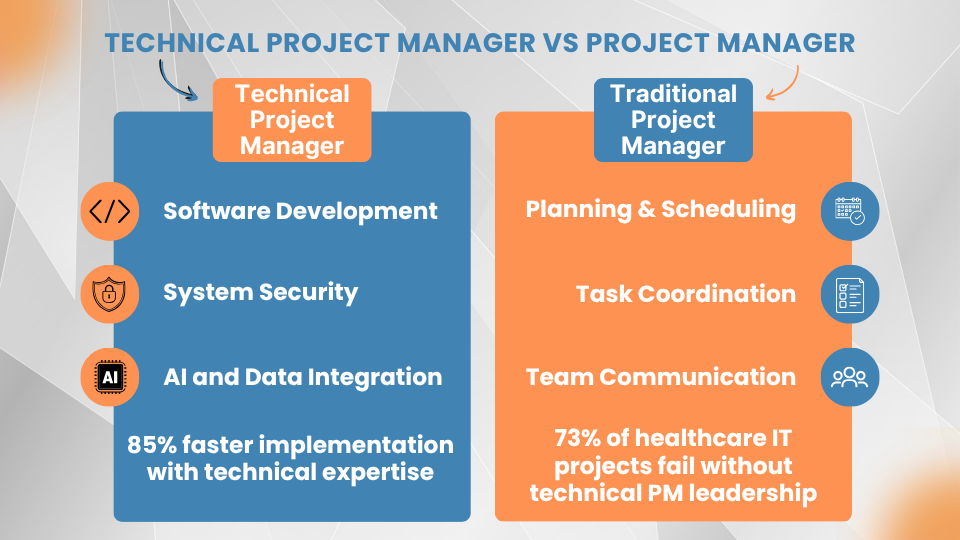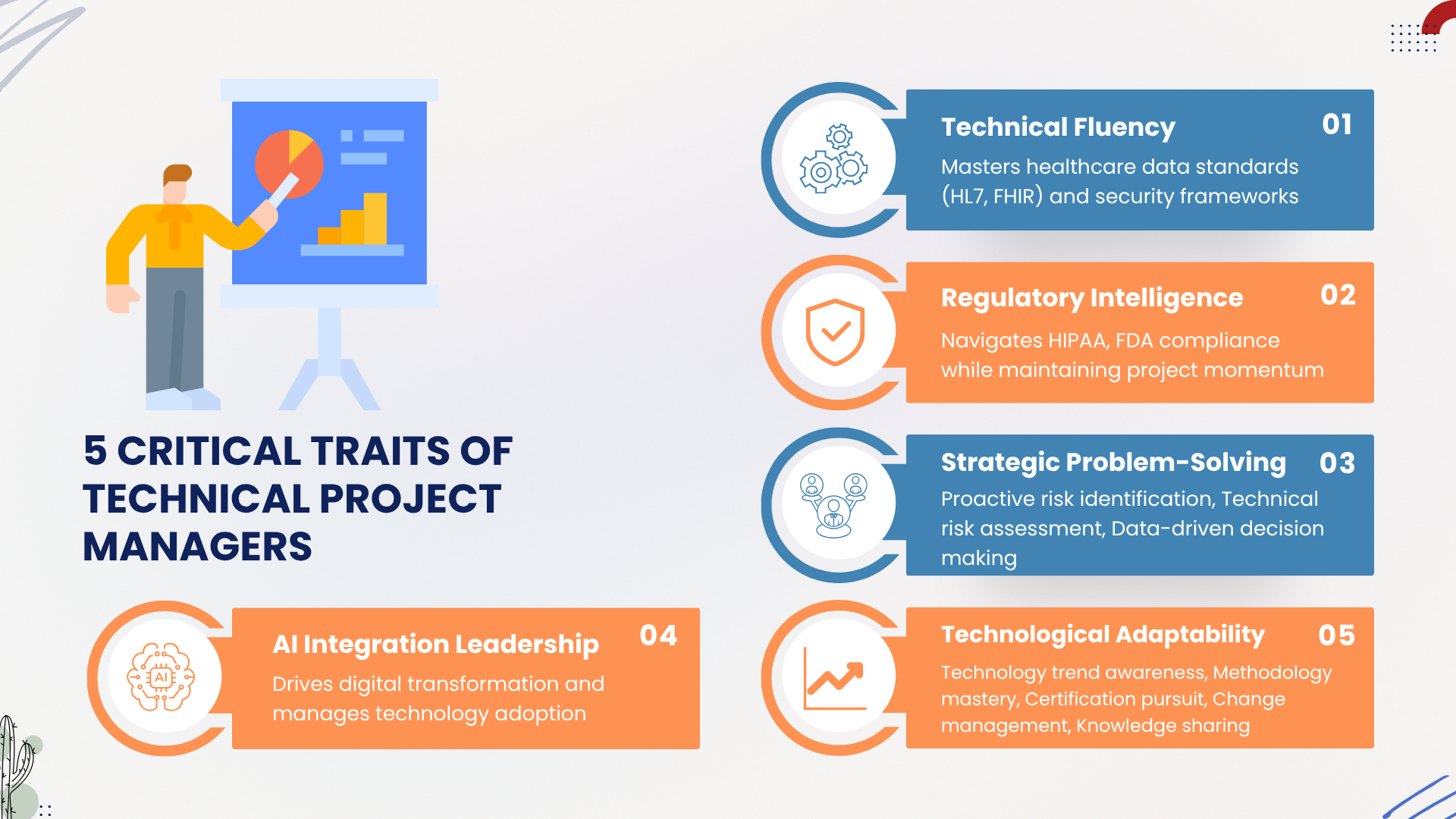
Healthcare IT transformations don’t fail because of bad technology. They fail because of poor leadership. Organizations often fixate on picking the correct EHR system or negotiating vendor contracts, completely forgetting the most important key to success: the technical project manager responsible for steering their implementation from chaos to clarity.
The healthcare industry frequently attributes technology failures to “user resistance” or “insufficient training.” These excuses merely shift blame away from the truth—most healthcare IT catastrophes stem from technical project managers whose skill sets fail to comprehend the complex interplay of technology, regulations, and people.
Unlike traditional project managers who focus on timelines and budgets, exceptional technical project managers in healthcare must master five distinct traits that separate transformational leaders from task coordinators. These aren’t soft skills found in typical project management training—they’re hard-won competencies determining whether your multi-million-dollar EHR implementation becomes a patient care catalyst or an expensive cautionary tale.
What Separates a Technical Project Manager from a Regular Project Manager

The technical project manager vs project manager distinction isn’t just technical knowledge—it’s the ability to make technical decisions directly impacting patient outcomes. Regular project managers coordinate activities and manage resources. Technical project managers architect solutions and anticipate technical consequences affecting clinical workflows six months post-go-live.
Consider the Epic implementation at a hospital. The technical project manager didn’t simply manage installation timelines—he/she crafted the data migration plan, maintaining 15 years of patient history with zero downtime. This required understanding database architecture, clinical workflow dependencies, and regulatory compliance simultaneously.
The technical project manager vs project manager distinction becomes critical when dealing with healthcare’s unique challenges. Regular project managers might accept vendor promises about “easy integration” with existing infrastructure. Technical project managers examine API documentation, test data flow scenarios, and identify integration bottlenecks before they derail implementations.
This technical depth allows technical project managers to proactively address integration challenges while testing data flow scenarios to prevent implementation roadblocks.
Technical Fluency Beyond Surface Knowledge
Most healthcare IT projects fail during integration, not installation. Success often depends on whether the technical project manager understands the technical implications of seemingly simple decisions made months earlier.
Real technical fluency means understanding clinical system interactions at data levels, not just user interfaces. When Mount Sinai implemented their population health platform, their technical project manager caught a critical issue that would have corrupted patient risk scores. The vendor’s standard integration assumed specific lab result data formats, but Mount Sinai’s legacy system used different encoding standards.
Technical skills for project management in healthcare require this deep understanding. Incorrectly performed risk calculations could have critically impacted patient care decisions long after go-live—an issue technical project managers without comprehensive technical understanding would have completely overlooked.
Mastering Technical Project Management Frameworks
Integrating Agile practices into healthcare technical project management requires accounting for distinct regulatory and clinical considerations. While Agile frameworks suit software development, they need adjustment for healthcare’s rigorous safety tests, regulatory evaluations, validation schedules, and complex clinical workflow examinations.
Exceptional technical project managers balance Agile adaptability with validation rigor by constructing tailored hybrid frameworks. They establish development sprints incorporating clinical evaluation components, regulatory approval timelines, and patient safety evaluations. This technical project management approach ensures rapid progress while maintaining healthcare environment standards.
DevOps principles also require adaptation for healthcare settings. Continuous integration works differently when code changes must be tested against patient data privacy requirements and clinical decision support rules. Understanding these particulars enables technical project managers to accelerate implementation schedules during compliance-driven processes.
Essential Technical Skills for Project Management Success

Technical skills for project management in healthcare extend far beyond basic IT knowledge. Technical project managers need to work on a combination of things like healthcare data standards HL7, FHIR, DICOM, cybersecurity frameworks, cloud architecture, database management, Api integration and comprehensive regulatory compliance on HIPAA, HITECH and FDA_IDENTIFIER requirements.
These technical skills for project management become crucial during system integrations. Technical project managers need expertise in:
- Healthcare interoperability standards
- Clinical workflow optimization
- Data migration methodologies
- Security architecture design
- Regulatory compliance frameworks
- Change management in clinical environments
- The most successful technical project managers continuously develop these skills through specialized training programmes and hands-on experience with complex healthcare implementations.
Bridging Technical and Business Languages
Translating complex technical frameworks into business implications transcends communication—it represents strategic leadership. When explaining API rate limiting effects on clinical workflows, great technical project managers avoid concentrating on the technical specifications. They describe how system lags during peak periods could bottleneck patient care decision processes and heighten physician aggravation.
This translation ability becomes crucial during project management technical question sessions with executives. When CEOs ask why data migration takes six months, technical project managers don’t explain database schemas and ETL processes. They explain how rushing data migration could result in incomplete patient histories being made available to physicians, potentially compromising care quality.
The best technical project managers also know when to let technical experts speak directly to business stakeholders. Sometimes CFOs need to hear infrastructure costs directly from IT architecture teams. The technical project manager’s role is to ensure that these discussions occur directly without excessive filtering.
During project management technical question sessions, skilled technical project managers craft all-in-one replies that cover technical aspects as well as the business impact so that all parties appreciate the difficulty of implementation but remain aligned with company goals.
Regulatory Intelligence and Compliance Mastery
Healthcare compliance failures don’t just cost money—they destroy trust and can shut down entire implementations. The average healthcare organisation faces regulatory penalties of $2.3 million annually for compliance violations, many stemming from poorly managed IT implementations failing to address regulatory requirements during design phases.
Technical project managers must understand that HIPAA, HITECH Act, and FDA regulations aren’t just legal requirements—they’re technical constraints built into system architecture from the beginning. Technical project managers treating compliance as an afterthought create technical debt, which becomes exponentially more expensive to resolve post-implementation.
The technical project manager job description in healthcare must include expertise in risk assessment frameworks evaluating security threats alongside clinical workflow impacts. This means understanding how multi-factor authentication affects emergency department workflows, how encryption impacts system response times during peak usage, and how audit logging requirements affect database performance.
When Providence Health System faced $22 million in HIPAA penalties related to their EHR implementation, the root cause wasn’t malicious behaviour—it was a technical project manager who didn’t understand how system logging requirements affected backup and recovery procedures.
Navigating Healthcare Data Security
Healthcare data security involves more than encryption technology. Technical project managers must analyse how different security methods affect system usability and clinical workflows, building security frameworks that protect patient data while preventing clinical workflow encumbrances that could delay critical patient services.
Effective technical project managers comprehend security measure relevance within business contexts. During the design of EHR system access controls, both user roles and lower hierarchical access levels are taken into consideration in relation to clinical workflow patterns and care coordination concerning the patient.
The technical project manager job description requires balancing security requirements with operational efficiency, ensuring compliance doesn’t interfere with clinical effectiveness.
Audit Trail and Documentation Excellence
Technical project management entails preparing documentation for clinical personnel, regulatory auditors, clinical staff, technical teams, and executive stakeholders simultaneously. This isn’t simply fulfilling documentation prerequisites—it’s developing information assets supporting current processes and future enhancements.
The best technical project managers create documentation policies capturing decision rationales alongside critical system performance metrics and system-wide clinical workflow impacts. That kind of documentation is very useful for regulatory audits and system upgrades.
Technical project managers must ensure their documentation strategies align with technical project management meeting best practices within the healthcare sector’s standards.
Stakeholder Orchestration Across Technical and Clinical Teams
Healthcare IT system implementations involve more complex stakeholder relationships than any other field. Technical project managers must simultaneously address physician management, nursing workflows, IT security needs, and administrative productivity goals—often when these considerations conflict.
Outstanding technical project managers do more than coordinate communication among interdependent network groups—they forge shared ownership for project results. They determine success indicators aligned with every stakeholder and devise incremental implementation phases showcasing value to every group.
This orchestration ability becomes especially important during crises. When system issues arise, technical project managers must manage responses spanning multiple teams while keeping clinical workflows and patient safety priorities intact. What distinguishes exceptional technical project managers is their ability to rapidly make decisions under pressure, considering all stakeholders.
AI Integration and Digital Transformation Leadership
Healthcare AI implementations represent the most complex technical project management challenges in today’s industry. Unlike traditional software deployments, AI integration requires technical project managers to understand machine learning principles, clinical decision support frameworks, and regulatory requirements for algorithm-based medical devices.
The FDA’s recent guidance on AI/ML-based medical devices creates new compliance requirements most technical project managers haven’t encountered. These systems require continuous monitoring, performance validation, and algorithmic bias assessment—technical responsibilities extending far beyond traditional technical project management.
Technical project managers initiating AI functions face unique change management challenges. Beyond implementing algorithm-aided clinical decision support systems, they must address distinctive change management aspects accompanying algorithms. Healthcare professionals relying on clinical insight might resist AI suggestions, particularly when reasoning processes leading to those suggestions remain opaque.
Change Management in Technology Adoption
The technical project manager vs project manager distinction becomes most apparent during technology adoption phases. Regular project managers focus on training completion rates and user feedback scores. Technical project managers monitor system utilisation patterns, identify workflow bottlenecks, and adjust technical configurations supporting clinical adoption.
Healthcare technical project management requires understanding technology adoption’s impact on clinical outcomes. This means monitoring utilisation not just from login perspectives but from clinically relevant user engagement standpoints. Great technical project managers establish metrics connecting technology utilization to clinical quality indicators.
Data Migration and System Integration
Technical project management of data migration requires understanding both technical and clinical implications of data transformation decisions. Patient data transcends simple information—it’s vital for clinical decision-making. Data migration errors can endanger patients long after system implementation.
The most challenging aspect of healthcare data migration isn’t technical details—it’s protecting data quality while maintaining clinical operations continuity. Technical project managers must define data migration approaches, retaining dataset connections, preserving clinical context, and meeting compliance requirements.
Professional Development for Technical Project Managers
Technical project manager course options have expanded significantly as healthcare organizations recognize the need for specialized training. Leading programs combine traditional project management methodologies with healthcare-specific technical skills, regulatory knowledge, and clinical workflow understanding.
The most comprehensive technical project manager course offerings include:
- Healthcare data standards and interoperability
- Regulatory compliance frameworks
- Clinical workflow optimization
- Security architecture for healthcare
- Change management in clinical environments
- Risk assessment methodologies
- Technical project managers pursuing professional development should seek programs offering hands-on experience with healthcare implementations alongside theoretical knowledge.
Business Impact Measurement and ROI Demonstration
Technical project managers focusing solely on technical aspects miss opportunities to demonstrate tangible business value. Healthcare organisations invest in technology to improve patient clinical outcomes while reducing operational costs and enhancing clinical productivity. Technical project managers must create frameworks measuring actual technology implementation impact on organisational business objectives.
This requires integrating clinical workflows with patient care and operational workflows with patient satisfaction. When the technical project manager at Boston Children’s Hospital enhanced EHR system response times, he didn’t merely report improved page loading speeds—he demonstrated that enhancements reduced physician documentation time by 15 minutes per patient, increasing patient interaction time.
The ability to evaluate and articulate technology initiative impacts on business value chains transforms technical project managers from technical administrators to strategic collaborators, garnering sustained sponsorship for technical initiatives while cementing credibility for subsequent projects.
Practical Tools and Frameworks for Technical Project Managers
The best technical project managers don’t use one-size-fits-all project management software—they construct specific frameworks needed for healthcare IT. These tools must balance technology complexity, regulatory compliance, and clinical workflow integration simultaneously.
Technical Competency Assessment Framework
Every technical project manager must assess their skills objectively. Diagnosing self-improvement areas requires measurable benchmarks found in healthcare data standards, integration architectures, and compliance frameworks.
Comprehensive assessment frameworks measure domain-specific clinical knowledge: clinical data standards (HL7, FHIR, DICOM), healthcare regulations (HIPAA, HITECH, FDA), integration technologies (APIs, ETL, real-time data streaming), and clinical workflow optimisation.
Stakeholder Communication Templates
Effective project management technical questions require structured approaches ensuring all relevant technical and clinical perspectives receive consideration. Technical project managers need templates guiding stakeholder discussions while capturing information needed for technical decision-making.
These templates should address different stakeholder communication needs: executive briefings focusing on business impact, clinical team discussions emphasising workflow implications, and technical team meetings diving into implementation details.
Career Path and Compensation for Technical Project Managers
The technical project manager job description has evolved significantly as healthcare organisations recognise the strategic importance of technical leadership. Current market data shows technical project managers in healthcare IT earning between $95,000-$150,000 annually, with senior positions exceeding $180,000. Compensation varies based on experience, location, certifications, and company size.
Technical project managers with deep regulatory knowledge and proven implementation records command premium salaries. The technical project manager job description increasingly emphasises:
- Healthcare data standards expertise
- Regulatory compliance mastery
- Clinical workflow optimization
- Security architecture knowledge
- Change management capabilities
- Business impact measurement skills
- Elevating Healthcare IT Through Exceptional Technical Project Management
- The healthcare industry’s digital transformation depends on technical project managers who can navigate the complex intersection of technology, regulation, and clinical care. These leaders don’t just manage projects—they architect solutions, improving patient outcomes while supporting organizational objectives.
Technical project management excellence requires continuous learning, adaptive frameworks, and deep understanding of healthcare’s unique challenges. Organisations investing in skilled technical project managers position themselves for successful digital transformations that enhance patient care while achieving business objectives.
Conclusion
The healthcare IT landscape doesn’t forgive mediocrity. Each failed system implementation, security breach, or compliance violation can be traced to leadership gaps that could have been prevented with skilled technical project managers.
Mastering these five traits makes a technical project manager exceptional. Such professionals don’t just complete projects—they transform organisational dynamics. They convert resistant physicians into technology advocates, transform chaotic rollouts into smooth transitions, and turn budget overruns into cost savings.
Finding technical project managers with these qualities remains challenging. Most candidates have either technical skills or project management experience, but fewer understand healthcare technology’s intricate regulations. Success comes from organisations with adept leaders understanding technical project management’s dual nature—an art and science blend.
Whether implementing new EHR systems, integrating artificial intelligence technologies, or managing comprehensive digital transformation projects, success depends on having proper technical project managers leading initiatives. The question isn’t whether investing in exceptional technical project managers fits your budget—it’s whether you can afford not to hire them.
At Virtelligence, we’ve spent years identifying and developing technical project managers possessing all five critical traits. We understand healthcare organisations need more than project coordinators—they need strategic leaders navigating technical complexity while driving business results.
FAQs
What’s the difference between a technical project manager and a regular project manager?
The technical project manager vs project manager distinction lies in technical depth and decision-making capability. Technical project managers blend deep technical knowledge with standard project management practices, enabling informed technical decisions and facilitating communication between development teams and business stakeholders. Regular project managers focus on coordination, schedules, and resources without the technical depth required for complex healthcare IT implementations.
What technical skills are most important for healthcare IT project managers?
Essential technical skills for project management in healthcare include healthcare data standards (HL7, FHIR), cybersecurity frameworks, cloud architecture, database management, API integration, and comprehensive regulatory compliance knowledge, including HIPAA, HITECH, and FDA requirements for medical devices. Technical project managers must also understand clinical workflows and change management in healthcare environments.
How much does a technical project manager earn in healthcare IT?
Technical project managers in healthcare IT typically earn $95,000-$150,000 annually, with senior positions exceeding $180,000. Salary varies based on experience, location, certifications, and company size. Technical project managers with deep regulatory knowledge and proven implementation records command premium compensation.
What certifications should a technical project manager pursue?
Recommended certifications include PMP (Project Management Professional), Agile/Scrum Master certifications, CISSP for cybersecurity, and healthcare-specific credentials like CPHIMS (Certified Professional in Healthcare Information Management Systems) and CHTS (Certified Healthcare Technology Specialist). A specialised technical project manager course focusing on healthcare IT is also highly valuable.
Can you become a technical project manager without a technical background?
While challenging, it’s achievable through rigorous technical project management training, mentorship programmes, and starting with simpler projects to build technical skills. However, most successful candidates have healthcare or technical backgrounds, which ease the transition into technical project management. Comprehensive technical project manager course programmes can help bridge knowledge gaps.
What does a typical technical project manager job description include?
A comprehensive technical project manager job description includes healthcare data standards expertise, regulatory compliance mastery, clinical workflow optimisation, security architecture knowledge, change management capabilities, and business impact measurement skills. The role requires balancing technical complexity with clinical requirements while ensuring regulatory compliance and stakeholder satisfaction.






